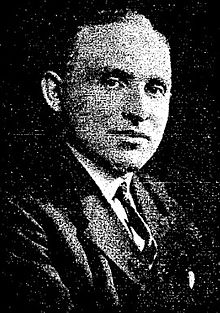Salo W. Baron
Salo (Shalom) Wittmayer Baron , also Salo Baron (born May 26, 1895 , in Tarnów , Austria-Hungary ; died November 25, 1989 in New York ), was an Austrian-American historian . From 1930 until his retirement in 1963 he taught at Columbia University .
Life
Baron came from a wealthy family in Tarnów, his father was the owner of a bank and head of the local Jewish community, which at the time had 16,000 members. His mother tongue was Polish, but he spoke about 20 other languages, including Yiddish, Hebrew, English, and French. Salo received both a humanist and a Jewish education. Until the age of 17, he was tutored by private tutors for eight years . In 1913 he graduated from high school in Cracow and studied for a year at the Jagiellonian University . In 1914 he moved to Vienna, where he attended the local university studied and Philosophy (1917), political science (1922) and Law (1923) received his doctorate . In 1920 he was ordained as a rabbi by the Jewish Theological Seminary in Vienna . From 1919 to 1926 he taught history at the Jewish Pedagogy in Vienna. At the invitation of Stephen Wise , he moved to New York, where he was a teacher at the Jewish Institute of Religion from 1927 to 1930 and then until 1963 as a professor at Columbia University . He is considered the founder of the Jewish Studies in the US ( Jewish Studies ).
Baron has held numerous senior positions in the public and academic sectors. Among other things, he was President of the American Jewish Historical Society from 1953 to 1955 . He was the founder and president of the Jewish Cultural Reconstruction Corporation in Wiesbaden, which, after the Second World War, looked for and reclaimed libraries and other cultural treasures that had been confiscated by the National Socialists. In this role he worked closely with Hannah Arendt . In 1964 he was elected to the American Academy of Arts and Sciences .
After the war, Baron headed the Jewish Cultural Reconstruction, Inc. , an organization that had set itself the task since 1947 of collecting, systematising, and distributing to Israeli and US libraries, archives and museums, now dispossessed formerly Jewish property in Europe to distribute.
In 1961, Professor Baron testified in the case of Adolf Eichmann in Jerusalem . Baron explained the historical background to the Shoah against the Jews.
Intellectual creation
According to Yosef Hayim Yerushalmi , successor to Salo W. Baron as Professor of Jewish History , Culture and Society at Columbia University from 1980 to 2008, Baron was "the greatest Jewish historian of the 20th century". In particular, his life's work, A Social and Religious History of the Jews (Columbia University Press), a project that began with a series of lectures in Columbia and quickly developed into a three-volume overview of Jewish history, is one of these great achievements.
Even today, Baron stands in Jewish historiography for a vehement defense against so-called lacrymoser, as historiography focused on the suffering in the Jewish diaspora. This school is often associated with Heinrich Graetz , who, as an early Jewish historian, identified suffering as a central and historically continuous element. Baron initiated a critical research, in his eyes "suffering was part of the fate [of the Jews], but just as repeated joy as well as ultimate salvation."
Professor Baron's project was to integrate religious dimensions of Jewish history into a more complete picture of Jewish life. At the same time, he did not see Jewish history in isolation, but as part of the larger history and society in which Jews lived and worked.
Fonts (selection)
- Jewish question at the Congress of Vienna , 1920
- The Jewish Community (3 volumes, 1942)
- Modern Nationalism and Religion , 1947
- Jews of the United States, 1790–1840: A Documentary History (edited with Joseph L. Blau, 3 volumes, 1963)
- Russian Jews Under Tsars and Soviets , 1964
- A Social and Religious History of the Jews (1937; 27 volumes, 2nd edition 1952–1983)
- History and Jewish Historians , 1964
- Nahum Goldmann Hg .: Germans and Jews. Main presentations at the World Jewish Congress 1966. Series: Edition Suhrkamp 196. Contribution by Gershom Scholem , Golo Mann , Salo W. Baron, Eugen Gerstenmaier and Karl Jaspers . Suhrkamp, Frankfurt 1967 ISBN 3-518-10196-X
literature
- Encyclopaedia Judaica , Vol. 4, pp. 253f.
- Norman Roth: Salo Wittmayer Baron (1895–1989) , in: Helen Damico, Joseph B. Zavadil (ed.): Medieval Scholarship. Biographical Studies on the Formation of a Discipline, Volume 1: History (= Garland Reference Library of the Humanities, Volume 1350), Garland Publishing, New York 1995, ISBN 0-8240-6894-7 , pp. 277-287
- Elisabeth Gallas : »The morgue of books«. Cultural restitution and Jewish historical thinking after 1945. Series: Writings of the Simon Dubnow Institute. V&R , Göttingen 2013 ISBN 3-525-36957-3 , Baron: passim
Web links
notes
- ↑ Boyd, Kelly, ed. Encyclopedia of Historians and Historical Writers (Rutledge, 1999) 1: 75-76
- ↑ Laurence E. Balfus: Salo Baron. 2000, accessed November 30, 2016 .
- ^ A b Peter Steinfels, "Salo W. Baron, 94, Scholar of Jewish History, Dies," New York Times, November 26, 1989. [1]
- ↑ Robert Liberles: Salo Wittmayer Baron: Architect of Jewish History . New York University Press, 1995, pp. 117-118. ISBN 0-585-33140-5 .
- ↑ In the primary literature of the book, 19 essays Barons from 1928 to 1977 are listed
| personal data | |
|---|---|
| SURNAME | Baron, Salo W. |
| ALTERNATIVE NAMES | Baron, Salo Wittmayer (full name); Baron, Shalom Wittmayer; Baron, Salo |
| BRIEF DESCRIPTION | Jewish historian |
| DATE OF BIRTH | May 26, 1895 |
| PLACE OF BIRTH | Tarnów , Kingdom of Galicia and Lodomeria , Austria-Hungary |
| DATE OF DEATH | November 25, 1989 |
| Place of death | New York City , New York , United States |
